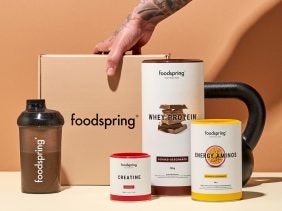Pea Protein: The vegan protein source your muscles will love
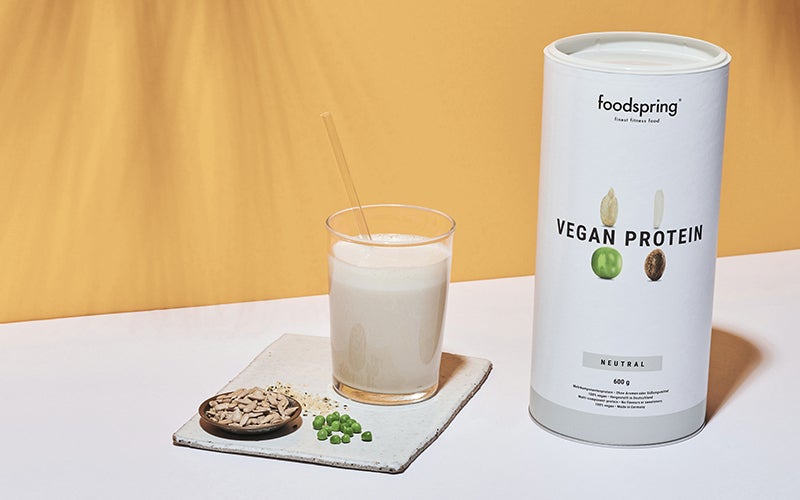 ©foodspring
©foodspring
In the fitness industry, there are more and more plant-based protein powders available every day. Pea protein powder is among the most popular for numerous reasons. In this article, we tell you why it’s so beloved as well as how it can help you build muscle mass and lose weight.
We’ll do a lot to reach our desired level of fitness, from bicep curls to burpees, but it’s all for nothing if we aren’t also consuming enough protein to develop more muscle mass. Of course, eating protein is essential even if developing muscles is the last thing on your mind, because proteins are composed of amino acids, which are the basic building blocks of our bodies’ proteins. The protein we consume through our diet contributes greatly to the regeneration of our muscles, nerves, and connective tissue, whether you’re working out or not.
More and more professional and amateur athletes have begun to rely on protein powders to ensure they’re meeting their daily protein needs. Though some of the most popular protein powders are made with whey protein isolate or whey protein concentrate, both of animal origin, lately plant-based proteins have also been making their way into shoppers’ carts. Even though they’re vegan, they’re not specifically reserved for vegans — anyone can enjoy them!
Pea protein isolate is one of the best known ingredients that’s featured in plant-based protein powders. But what makes it so great at feeding your muscles? We’re about to tell you!
What is pea protein?
Before we break down the type of protein found in peas, here’s a quick overview of the other nutrients in this green vegetable: Along with plenty of protein, it also contains many vitamins, minerals, trace elements, and fiber. Peas are an excellent source of B vitamins, potassium, and folic acid, and if you ever come across them fresh at the market, pop them straight into your basket.
Now let’s move on to protein. Peas are among the most protein-rich legumes. Yellow peas are the variety with the most protein, and they’re used primarily to make protein powder through a technical process of drying and crushing that creates pea protein isolate.
What is the biological value of pea protein?
In case you don’t already know, a biological value measures the proportion of protein you absorb from a food against how much protein is actually in the food. Because not all protein is created equal! Protein is made up of a series of different amino acids, and the more those amino acids resemble what’s already in our bodies, the easier they are for us to absorb and the higher their biological value is. Protein from animals typically has a higher biological value than protein from plants because it has the same amino acids as the protein in our bodies. For reference, an egg has a biological value of 100. Aim to purchase a pea protein powder with a similar value.
Now you’re probably wondering, if pea protein powder is plant-based, and plants don’t have a very high biological value, what makes it such a great source of protein? Compared to other vegetables, peas have a particularly high amount of the essential amino acid lysine and the semi-essential l-arginine. And overall, pea protein powder has a relatively balanced mixture of essential and non-essential amino acids, bringing it’s biological value to 65. While that may seem small, it’s not really when you compare it to whey protein’s biological value of 85.
Developing muscle mass with pea protein
Successfully developing muscle requires two things: intensive and regular strength training sessions and a diet rich in protein. Even though it’s biological value is “only” 65, pea protein can absolutely be part of that diet.
In fact, pea protein powder is adapted to help anyone that wants to build muscle mass, whether their goal is a six-pack or strong biceps. As we previously mentioned, peas contain a non-essential amino acid called l-arginine which activates the release of growth hormones and promotes muscle development. In addition, pea protein contains a high amount of Branched-Chain Amino Acids (BCAA’s). These include valine, leucine, and isoleucine, all of which are particularly beneficial for effective muscle regeneration.
In order to increase the biological value of pea protein, try combining it with additional protein sources. If you combine rice protein with pea protein, for example, it will have a biological value closer to that of whey protein.
Our vegan protein powder combines 4 sources of high-quality vegetable protein. To boot, soy is not one of them — great news for anyone with a soy allergy! Composed of 78% pea protein isolate, our exclusive vegan protein proves that you don’t need animal products to get the nutrients you need. With the addition of sunflower and hemp, the product has a complete aminogram (or amino acid profile), meaning it contains all the essential amino acids. If you’ve been paying attention, then you can probably imagine how high the biological value of this product is.
Did you know that protein powder isn’t just for shakes? Some of our favorite recipes will show you how to incorporate it into your food in new and exciting ways, from sweet smoothies to protein-packed bread.
Green Smoothie
This green drink is totally vegan and totally refreshing! If you have a hard time eating your greens, why not try drinking them instead?
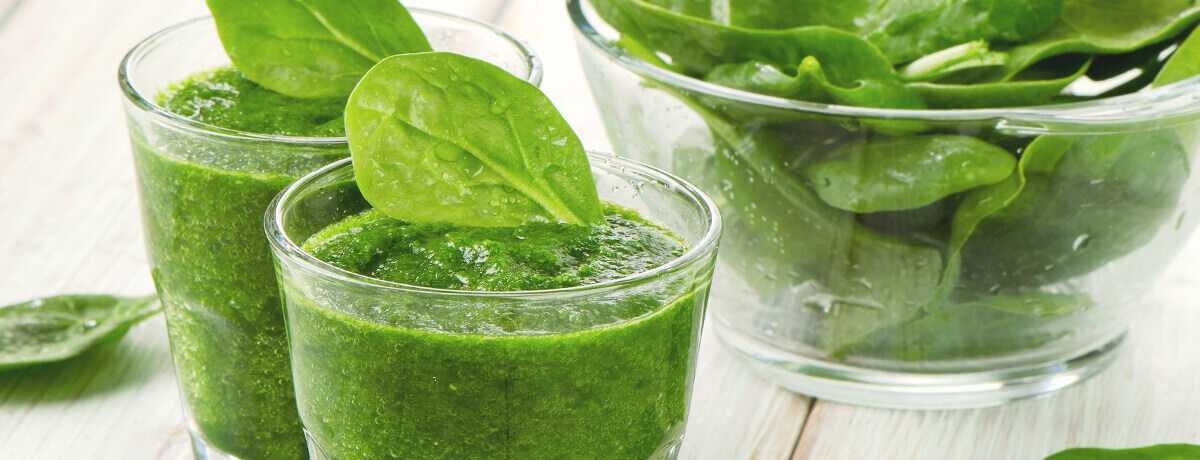
Moist vegan banana bread
Got a craving for something deeply comforting? Try this moist banana bread, which highlights our banana-flavored Vegan Protein. The secret to keeping it moist is a dollop of applesauce, while chia seeds add body and fiber.
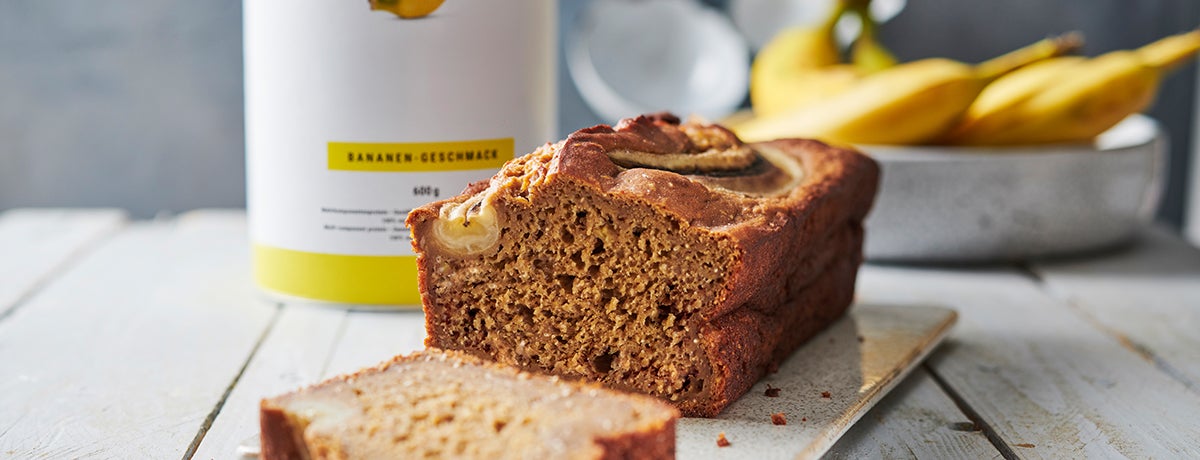
Banana split protein shake
An ice cream in a glass? Skipping the added sugar, amping up the protein? That’s something we can get behind 100%. Sound like your thing, too? Try out this tempting banana split protein shake recipe!
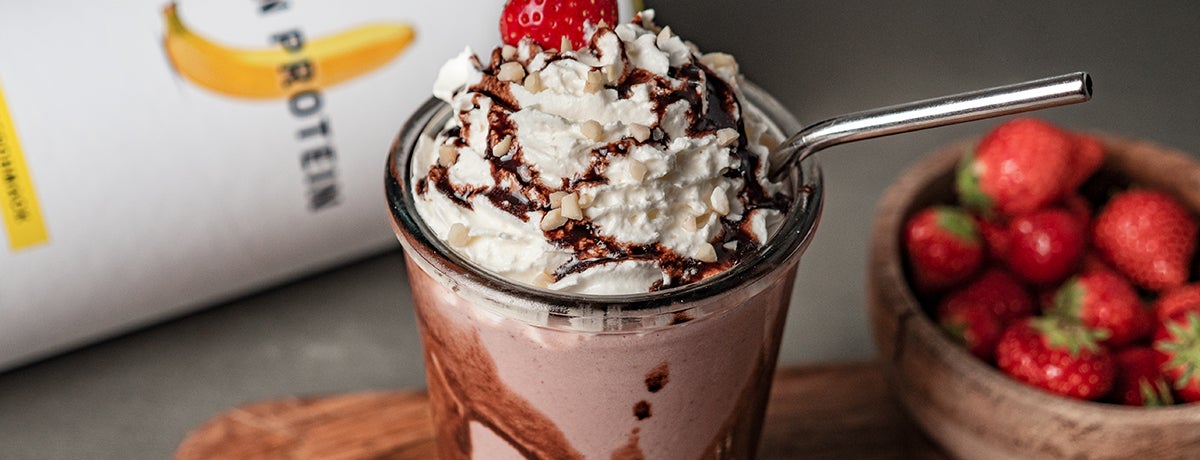
Still not sure it’s possible to develop muscles without any animal protein? Our article on vegan bodybuilding has all the concrete facts and tips that just might convince you.
Losing weight with pea protein
If your primary goal is losing weight, not gaining muscle, know that pea protein can also help. In addition to complex carbohydrates and healthy fats, quality protein is an essential part of any diet, whether you work out a lot or not. Because they contain additional nutrients, pea protein powder can guarantee a lasting feeling of satiety, so you’re not hungry for another snack every 30 minutes. In general, if you’re trying to lose weight, eating protein-rich meals can help you eat less overall throughout the day.
As we mentioned before, pea protein is rich in the amino acid lysine. When lysine is combined with methionine, another amino acid, our bodies use the two to synthesize L-carnitine, an amino acid compound. L-carnitine has a strong influence on the amount of fat you burn because it helps transport fatty acids into the cells where they are then converted into energy. If you are deficient in L-carnitine, it may be harder for you to lose fat. On the other hand, consuming enough lysine will ensure that your body can properly synthesize L-carnitine. And if you can’t get what you need through food, our vegan L-carnitine capsules will make it easy for you.
In addition to getting the right nutrients, use our Shape Guide to reach your weight loss goals. With more than 80 pages, it contains a highly effective 12-week program with intensive workouts and creative recipes that will help be successful. All you have to do is get started!
Pea protein vs. animal protein
In principle, there are two categories of protein: animal protein which includes whey and casein, both of which are also a dairy product, and plant protein, which includes soy, rice, and pea protein. Pea protein has many advantages:
- Pea protein is the plant-based protein source with the highest protein content.
- It’s vegan and thus suitable for people who don’t consume animal products.
- Because it’s lactose-free, it can also be enjoyed by people who are lactose intolerant.
- It is hypoallergenic, which means that it very rarely causes allergic reactions.
- It’s gluten-free and can be consumed by anyone with gluten intolerance.
Overall, pea protein has some great advantages, but it also has some disadvantages.
- Pea protein contains less protein and has a lower biological value than animal protein products like whey. Luckily you can combine it with other protein sources to obtain a similar biological value.
And if you have no dietary restrictions, you can consume both animal and vegetable proteins as needed! Each person has specific needs and different tastes, so don’t hesitate to try out different protein powder combinations to find what’s best for you. If you want to know more about some of the most common myths about veganism, check out our article!
Pea protein: Our conclusion
- Pea protein is a natural vegetable protein that’s primarily used to manufacture protein powder.
- Its biological value, which indicates the similarity between a food protein and a protein produced by the body, is 65.
- Pea protein contains large amounts of arginine, lysine, and branched chain amino acids (BCAA’s), namely leucine, isoleucine, and valine.
- A balanced diet with plenty of protein promotes both muscle development and weight loss.
Sources for this article
We at foodspring use only high-quality sources, including peer-reviewed studies, to support the facts within our articles. Read our editorial policy to learn more about how we fact-check and keep our content accurate, reliable, and trustworthy.

































